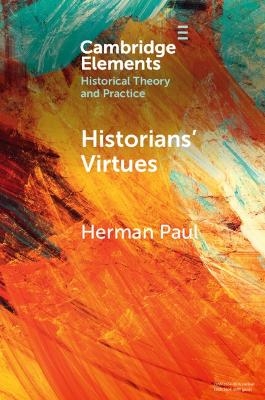
Historians' Virtues
From Antiquity to the Twenty-First Century
Seiten
2022
Cambridge University Press (Verlag)
978-1-108-99497-2 (ISBN)
Cambridge University Press (Verlag)
978-1-108-99497-2 (ISBN)
Why do historians so often talk about objectivity, empathy, and fair-mindedness? What roles do such personal qualities play in historical studies? And why does it make sense to call them virtues rather than skills or habits? This title is also available as Open Access on Cambridge Core.
Why do historians so often talk about objectivity, empathy, and fair-mindedness? What roles do such personal qualities play in historical studies? And why does it make sense to call them virtues rather than skills or habits? Historians' Virtues is the first publication to explore these questions in some depth. With case studies from across the centuries, the Element identifies major discontinuities in how and why historians talked about the marks of a good scholar. At the same time, it draws attention to long-term legacies that last until today. Virtues were, and are, invoked in debates over the historian's task. They reveal how historians position themselves vis-à-vis political regimes, religious traditions, or neoliberal university systems. More importantly, they show that historical study not only requires knowledge and technical skills, but also makes demands on the character of its practitioners. This title is also available as Open Access on Cambridge Core.
Why do historians so often talk about objectivity, empathy, and fair-mindedness? What roles do such personal qualities play in historical studies? And why does it make sense to call them virtues rather than skills or habits? Historians' Virtues is the first publication to explore these questions in some depth. With case studies from across the centuries, the Element identifies major discontinuities in how and why historians talked about the marks of a good scholar. At the same time, it draws attention to long-term legacies that last until today. Virtues were, and are, invoked in debates over the historian's task. They reveal how historians position themselves vis-à-vis political regimes, religious traditions, or neoliberal university systems. More importantly, they show that historical study not only requires knowledge and technical skills, but also makes demands on the character of its practitioners. This title is also available as Open Access on Cambridge Core.
Introduction; 1. The Historian's Character: Why Virtues Mattered; 2. What Virtues, Which Aims? Why Historians Disagreed; 3. Discourse Meets Practice: Virtues as Performance Criteria; 4. Who Can Be Virtuous? Inclusion and Exclusion; 5. What Happened to Virtue? Continuity and Discontinuity; Conclusion.
| Erscheinungsdatum | 14.09.2022 |
|---|---|
| Reihe/Serie | Elements in Historical Theory and Practice |
| Zusatzinfo | Worked examples or Exercises |
| Verlagsort | Cambridge |
| Sprache | englisch |
| Maße | 152 x 228 mm |
| Gewicht | 130 g |
| Themenwelt | Geisteswissenschaften ► Geschichte ► Allgemeine Geschichte |
| Geisteswissenschaften ► Geschichte ► Geschichtstheorie / Historik | |
| Sozialwissenschaften | |
| ISBN-10 | 1-108-99497-0 / 1108994970 |
| ISBN-13 | 978-1-108-99497-2 / 9781108994972 |
| Zustand | Neuware |
| Haben Sie eine Frage zum Produkt? |
Mehr entdecken
aus dem Bereich
aus dem Bereich
eine Familiengeschichte der Menschheit
Buch | Hardcover (2023)
Klett-Cotta (Verlag)
CHF 68,60
Eine wahre Geschichte von Schiffbruch, Mord und Meuterei
Buch | Hardcover (2024)
C.Bertelsmann (Verlag)
CHF 34,95


